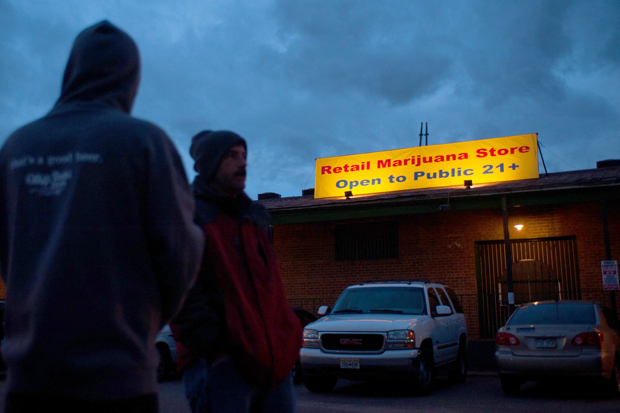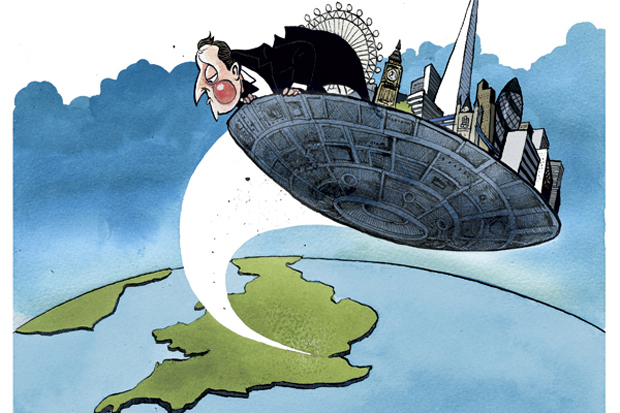Khat is a leafy stimulant chewed mainly, I gather, by Somalis. This week the government banned its possession and sale. And, for the life of me, I cannot figure out why.
Not being a Somali (or, indeed, a Russian murderer, whatever the sketch above might suggest) I can’t pretend that my life will now have a khat-shaped hole in it. Dimly, if I’m honest, I can remember a Swiss German hippy once giving me some leaves to chew on an Indian beach once, but they tasted horrid and I spat them out. So if I have taken khat, ever, it was then.
Generally, I prefer to buy my leafy stimulants in packets of ten or 20 at the corner shop, set fire to them, and lie to my wife. Or, failing that, to stew them up with some hot water, and add some milk. The usual sort of thing. Somalis, though, prefer khat. Apparently you could buy it all over the place if you knew where to look. Ask your Somali friends. I bet you’ve got loads.
According to Karen Bradley, who is a Home Office minister and not, apparently, that glam football lady off The Apprentice, khat has been banned because Britain’s Somali women wanted it to be. ‘They felt that khat was stopping the Somali community from integrating,’ was how she put it, ‘and it was distracting the husbands and sons from getting the education and the jobs that their wives and mothers desperately wanted them to get.’ Which ever so slightly makes you pity the poor sods for not being allowed to drink, either, doesn’t it? Or maybe that’s just me.
Why ban it, though? This is a policy which runs counter to almost everything sensible being done in the field of narcotics almost everywhere else in the world. In America, remember, various states are on various degrees down the road towards legalising the consumption, production and sale of marijuana. Washington and Colorado are already all the way there. Uruguay did the same late last year, and numerous other countries are mulling it over. Slowly and surely a battle of common sense is being fought and won.
Criminalise drugs, and it’s criminals who sell drugs. Decriminalise drugs, and it’s still criminals who sell drugs, but you now can’t arrest them for it. Legalise them, though, and the criminals are out of the loop. So, you can then tax, and regulate, and generally start treating what has formerly been a police problem as the public health problem it actually, so obviously, is. Nick Clegg is recommending we do something similar here. Look, he can’t be wrong about everything.
Banning khat would be illiberal enough if it was actually bad for you. Regardless of what those angry Somali ladies say, though, it doesn’t seem to be. Only last year, the government’s own Advisory Council on the Misuse of Drugs declared that it did no discernible harm save for perhaps being a bit harsh on the liver, and caused no identifiable social problems, and that the ‘overwhelming majority of council members’ were thus against a ban. In truth, the fact that one is happening anyway is largely due to fears that Britain might be becoming a hub for its export to the rest of the EU, where it is banned already. Or, as Ms Bradley has it, ‘The UK was at risk of becoming a base for organised criminals who wanted to smuggle khat to other countries.’
In other words, the only real bad thing about this silly leaf is that it’s illegal in some places, so we’re going to deal with that by making it illegal here, too. Madness. Don’t they realise that this is precisely where organised crime comes from? What is the Home Office taking?
Lack of drive
A few years ago, the bastards took my car. I’d been on holiday, and then I came back, and about a fortnight later I went to look for the thing and found it wasn’t there. They’d towed it, apparently, because of some roadworks.
I went a bit nuts, I won’t lie. I phoned up the head of Camden Parking and did quite a lot of shouting. ‘But we put up a sign,’ he said. ‘I was on holiday,’ I said. ‘But you came back,’ he said. ‘So?’ I said. ‘Am I honestly supposed to believe you didn’t check on your car for a fortnight?’ he said. That shook me. ‘Do you even live around here?’ I said. ‘No,’ he said.
Even now, two kids and a house later, I use my car — what? — three times a month? Maybe four? And only at weekends. Mine is a life of buses, tubes and trains or, when possible, walking. Everything is near. The school? Over there. The corner shop? Even closer. Just as well, too. Move the car, and you might not be able to park it again. These kerbs are fiercely contested.
Recently we’ve had builders in, though, so we’ve been staying at my in-laws; still in London but in an altogether more suburban part. There’s a driveway, and it’s just as well. We use the car to take my daughter to school. We use it to pick her up. Sometimes, one of us will give the other a lift to the Underground station. I’m never out of the bloody thing.
Last night, we ran out of milk. Do you know what I had to do? I had to get in my car and drive to a shop. I really did. Honestly. I don’t know how you people live like this.
Got something to add? Join the discussion and comment below.
Get 10 issues for just $10
Subscribe to The Spectator Australia today for the next 10 magazine issues, plus full online access, for just $10.
Hugo Rifkind is a writer for the Times.
You might disagree with half of it, but you’ll enjoy reading all of it. Try your first month for free, then just $2 a week for the remainder of your first year.















Comments
Don't miss out
Join the conversation with other Spectator Australia readers. Subscribe to leave a comment.
SUBSCRIBEAlready a subscriber? Log in